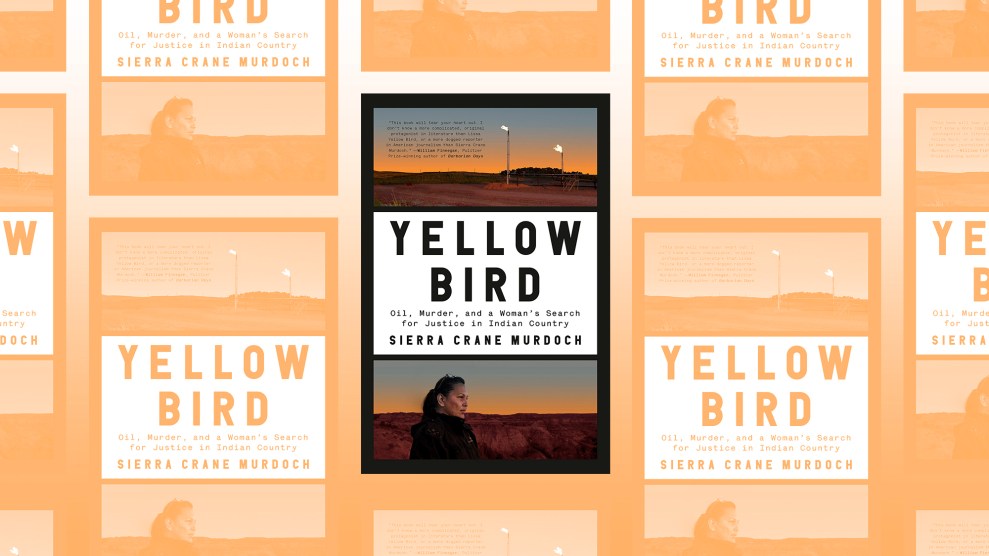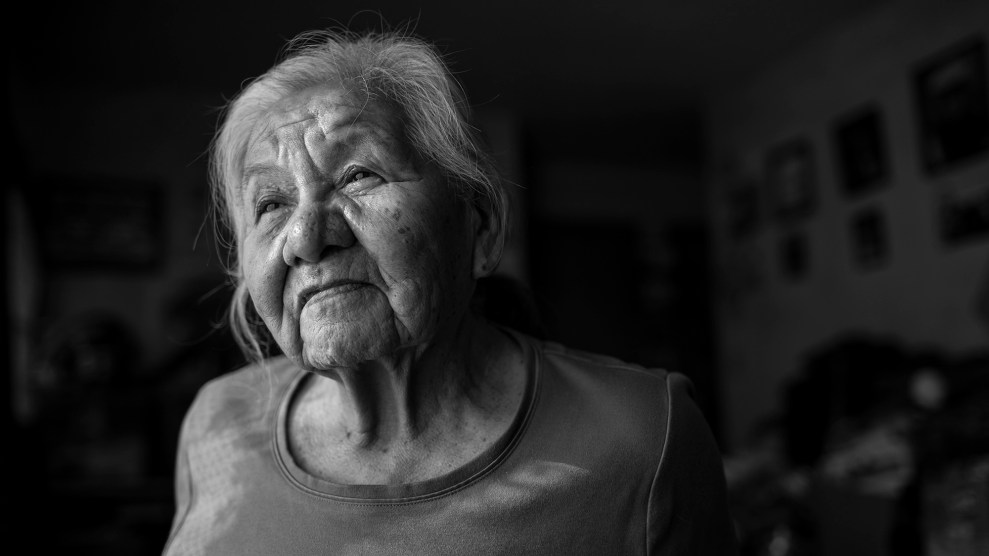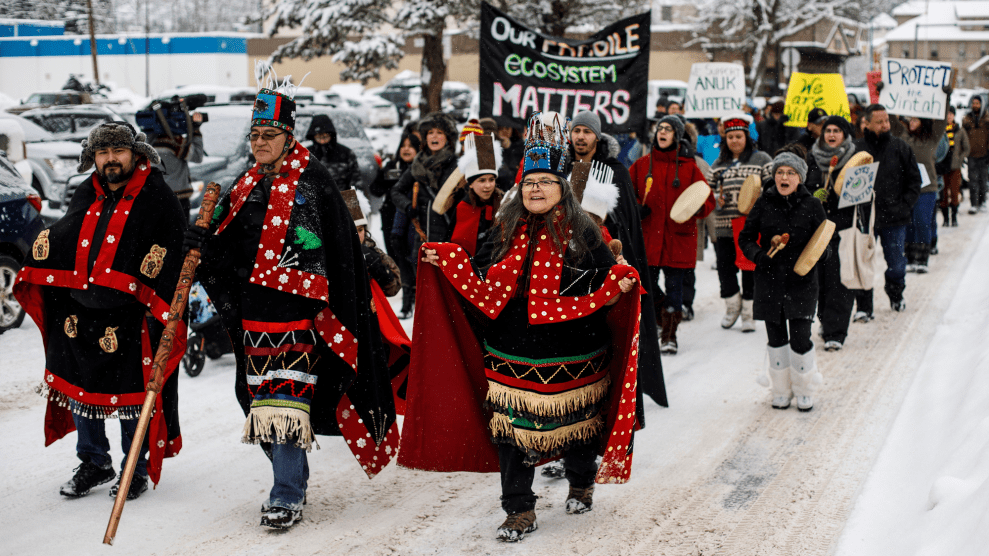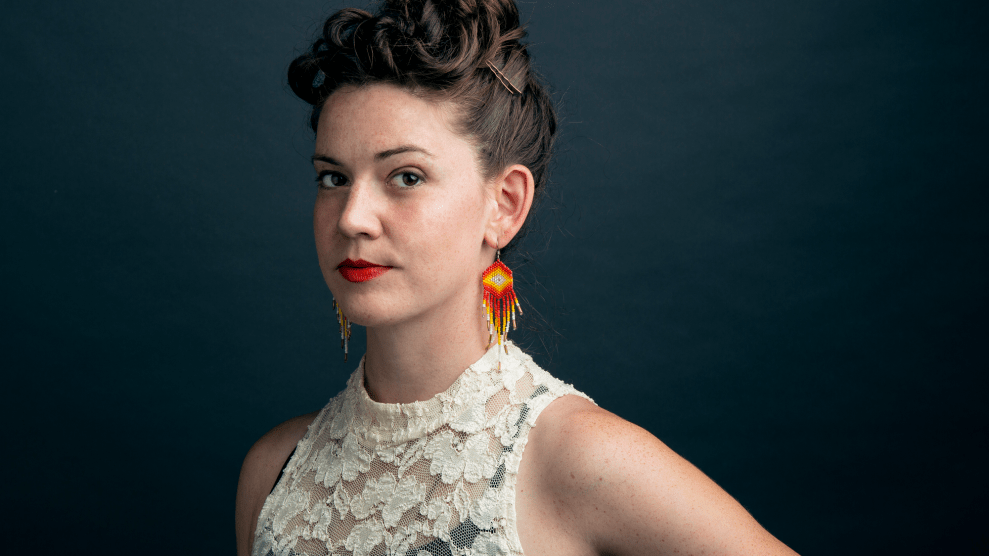
Mother Jones illustration
Since Yellow Bird: Oil, Murder, and a Woman’s Search for Justice in Indian Country was published in late February, it’s been praised as a masterful work of true crime reporting. And it is. But it’s not just that.
The centerpiece of the work is a grisly crime, yes—one made more compelling by the window through which it is viewed: a Native woman named Lissa Yellow Bird, who is determined to get to the bottom of the disappearance of a white oil worker, Kristopher Clarke, on the reservation. But it’s essential reading not because of the journey to get to the truth behind the crime—rather because it’s a nuanced, careful exploration of a Native community and the impact of generational trauma and violence on a family.
“I saw this crime as a way to peer into the transformation of this reservation and this tribal community—the Mandan, Hidatsa, and Arikara Nation—and really understand the way that outside interests over the course of centuries, but specifically in this moment, gain access to tribal resources and exploit those resources,” Murdoch tells me.
For full disclosure, Sierra is a friend, and I was lucky enough to follow part of her eight-year journey in reporting on Lissa Yellow Bird’s efforts to track down the people responsible for Clarke’s death, while embedding with the Yellow Bird family. But, objectively, I can say the resulting work is a tome where every word is weighted with meaning, where the prose is careful, exacting, and lovely; it’s a deeply reported portrait of a Native woman and the lingering effects of systemic trauma on a nation of people, threaded with crucial historical context.
Here, Murdoch and I talk about why people have trouble recognizing the violence they have themselves inflicted, how Lissa is truly a “force,” and when, as a white journalist, to take care of your privilege. This interview has been condensed and lightly edited for clarity.
So how do you describe Yellow Bird to other people?
Yellow Bird has been classified as true crime, and it’s a classification I’m a little resistant to. I admit it’s a true crime—there’s a crime at the center of the book.
But I was drawn to the story for all kinds of other reasons. Yellow Bird is also a work of long-form journalism. I see it as having three main elements: the murder mystery, this portrait of a reservation in the midst of this radical state of flux due to an unprecedented rush of money, and then Lissa Yellow Bird as the person who really drives the narrative, as the person through whom I was able to watch the story play out in this really compelling way. I stuck with this story because I met Lissa, the protagonist, and was immediately blown away by her.
I was so struck by the depth of your connection with Lissa. Did you worry about navigating that relationship as a journalist?
Anyone who reads the book will recognize Lissa immediately as a force. She is someone who’s intensely charismatic, magnetic, who draws people into her world. I write in the author’s note of the book that she’s someone who can conscript you into her story, so that it’s really difficult to actually separate yourself from her. And so I knew pretty early on in writing this book that it wasn’t going to be the type of immersive narrative like, say, Random Family by Adrian Nicole LeBlanc or Behind the Beautiful Forevers by Katherine Boo, these books that I really love. I could not be the kind of journalist out of remove, just observing the story unfolding around me; I was intrinsically involved in the narrative in the way that Lissa had compelled me to be, and that we would influence each other’s lives in these obvious and profound ways. And I couldn’t really extricate myself from that in an honest way.
It was also that Lissa has lived a life that is very much unlike the life that I have lived so far and there was a lot I didn’t understand about her experience. She’s a Native woman, who’s moved through her life as having an Arikara cultural and racial identity. She’s also a survivor of many things; she’s been an addict, she has been a sex worker. She has been a mother to five children. She had all these experiences that I did not understand myself or could not understand instinctually, and so I knew that in order to be able to come to a place of understanding with her, I would have to go really deep. I allowed myself to be drawn into her world, and I went with it in a way that was all consuming. But at the same time, it was always very clear in our relationship that I was the person who was writing this book.
I’ve seen you talk in other interviews about how you took care with your privilege. Is that a discussion you had with Lissa?
Yeah, we did talk explicitly about it. When I started writing this book, the question of who has the right to tell whose story was becoming a big part of the national conversation, particularly in art and in fiction. And in journalism, it’s a little different, right? Because as journalists, our job is to go out into communities that often are different from our own and to tell stories about those communities. So that is part of my job description, but I was writing this book that was sort of novelistic in nature. And I was also asking a lot of people to let me into their lives to the degree that they did, so I still felt that I had a responsibility to represent them in a way that felt true to them, and in a way that wasn’t going to repeat the mistakes that many journalists have made in the past in representing Native American communities.
I felt like part of the narrative power in Yellow Bird comes from Lissa’s position almost as a Native woman who is of her community, but still removed from it in so many ways. It’s an interesting perspective; it seems like it makes her more attuned to the changing dynamics of the reservation.
So Lissa got out of prison in 2009. She’d been there on drug charges. And 2009 was really when the oil boom was just beginning in North Dakota and on the Fort Berthold Indian Reservation. When Lissa got out of prison, she moved to Fargo, which is five hours east of the reservation. She hadn’t been home in many years, and she didn’t go home until that summer of 2009. She didn’t really see the oil boom until 2010 for the first time, and then it was 2012 when Kristopher Clarke disappeared. So, as the oil boom was really burgeoning on the reservation, Lissa was reestablishing her relationship with her home and with her family and was navigating the complex dynamics of being someone who just emerged from prison. So she was kind of seeing the oil boom with fresh eyes. I think for a lot of people who lived on the reservation during that time, the oil boom sort of snuck up on them. It didn’t happen immediately; it happened over the course of a few years. For Lissa, the change felt much more obvious. When she arrived on the reservation from out of prison, nearly the entire reservation had been leased out to oil companies. For her, it was pretty shocking.
Is there something that you hope readers take away from Yellow Bird?
There’s a reason I wanted people to see the oil boom through the lens of this crime, and there’s a reason why I wanted Lissa to help people see the oil boom through the lens of this crime. And that’s because I felt that the crime, and Lissa’s story, and the oil boom, wrapped up together, show how intimately our lives are connected and how violence can ripple through a community in ways that we aren’t always entirely aware of.
There is a lot of denial at the center of this crime. A shockingly high number of people are in denial about the violence that they’ve either committed themselves or they’ve participated in or they’ve been complicit in. That was, to me, the most troubling part of this story, and it’s something that Lissa saw and it’s something Lissa wanted to reveal and wake people up to. She was not only trying to wake up her own tribal community to the violence, but she was trying to wake up the perpetrators who are involved in this crime and were in denial about their own capacity for violence. She was trying to make them aware of what they’d actually done and to get them to come forward and to talk about it.
I want people to read this book and come away with an understanding of our own capacity for violence and how the way we covet other people’s resources and the ways we go about accessing those resources can affect a lot of people’s lives.
OK, what have I not asked you about that I should have?
One of the things about this book that is really important to me is that I see it as a family saga. I wanted to capture the history of the reservation through the Yellow Bird family, which takes profound pride in their critical thinking and in their understanding of their own history. Through tracing back the Yellow Birds through their generations and talking to Lissa’s family members about that history, the book exposes a lot of those layers of trauma that sort of added up to this moment of the oil boom. It’s like a new phase of trauma—the first phase being the taking of Native land, genocide, Indian Wars, and then leading into the boarding school era, leading into missionaries and the Garrison dam in the middle 20th century.
Can you elaborate on why the familial aspect of the book was so important to you?
Intergenerational trauma was something that Lissa and her relatives would bring up again and again with me. I got to this point where I realized it had a place in this story. In one sense, I wanted to know why the tribe was so vulnerable to certain negative impacts of the boom. Why, suddenly with the influx of money, would addiction rates rise on the reservation? Why was violence becoming a bigger issue than it had ever been before? It’s not like those things just suddenly appeared within the tribe. Many layers of trauma led to this point where the oil boom created these conditions that led to an increase in crime.
And I wanted to understand Lissa’s history. She spoke a lot about the way that she felt that her path was influenced by not only traumas that she had suffered in her life, but traumas that her relatives had suffered before her. I felt a responsibility to kind of go back in time and document those periods of trauma.
The other reason I was so fascinated by her family’s history was because I had wondered why Lissa had survived—why putting her own life at risk or being put at risk so many times in her life was she able to come through the other side. I realized that one of the reasons why she was able to survive, apart from luck, was that she had this family that loved her deeply; she had not only her mother, not only her grandmother, and not only her five children, but a vast network of uncles and aunts and other relatives who were her support for her whole life. She had generations before her who had survived—not only survived, but thrived.
I find this family to be joyful, and very smart, and very aware of the ways that their stories fit within a long history. The time I spent with this family gave me hope. I wanted that joy and that hope to be in the book.
















